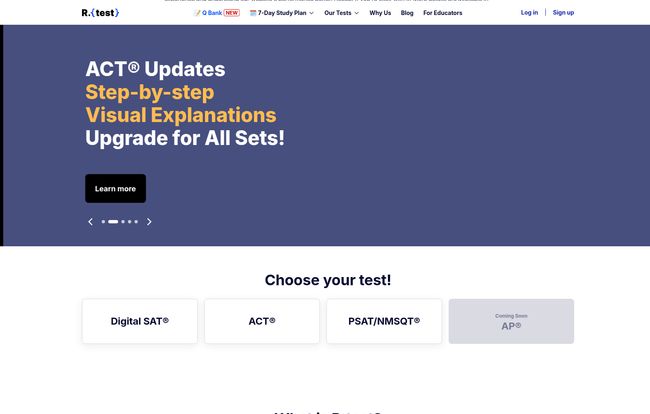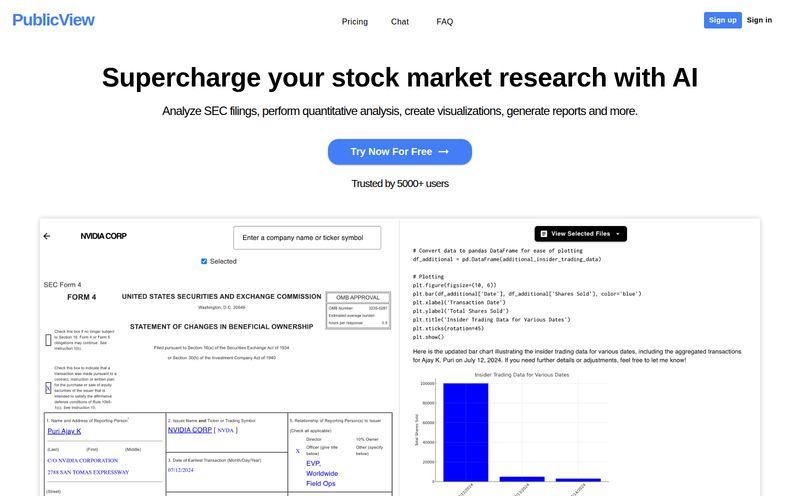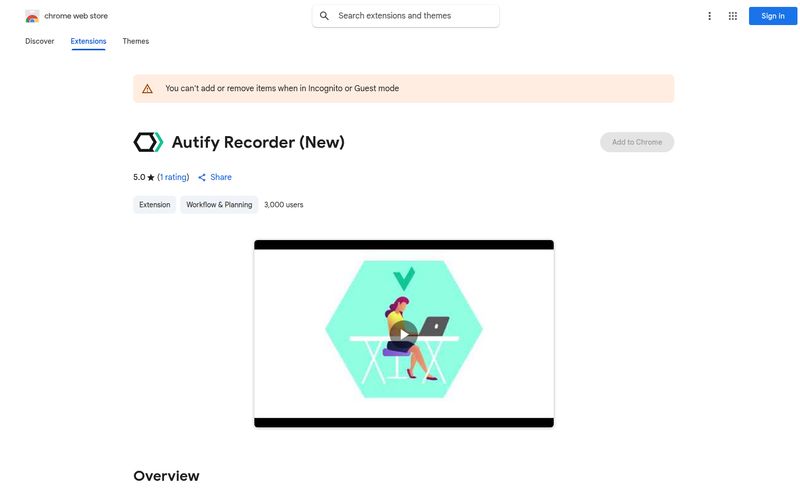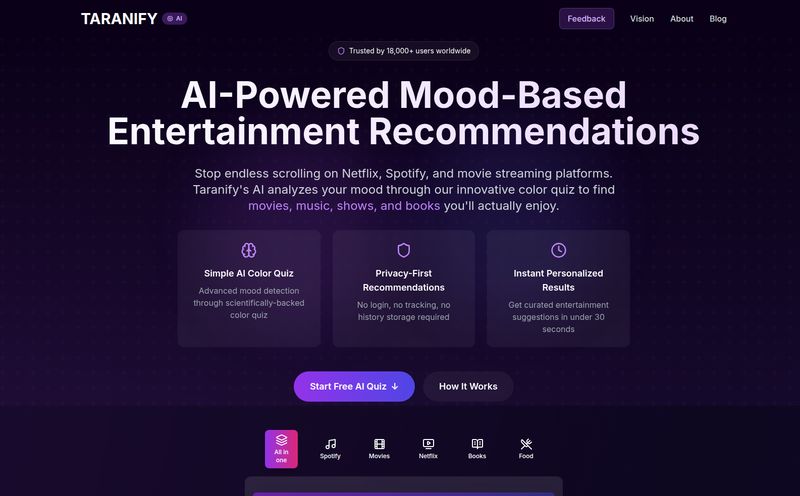Test prep. Ugh. Just the thought of it brings back memories of phonebook-sized study guides, the smell of No. 2 pencils, and the sinking feeling that you’re studying the wrong chapters. For years, the process was a brute-force attack: do hundreds of questions, hope for the best. It was inefficient, soul-crushing, and honestly, a bit of a guessing game.
But we’re living in the age of AI, where everything from our music playlists to our driving directions is personalized. So, it was only a matter of time before that intelligence seeped into the dreaded world of standardized testing. I’ve been keeping an eye on this space for a while, and a platform called R.test recently caught my attention. It claims to be an AI-powered diagnostic tool for the big leagues: the SAT®, ACT®, PSAT/NMSQT®, and even AP® exams.
The big question is, can an algorithm really give students the edge they need? Let's take a look.
First Impressions: What Exactly Is R.test?
At its core, R.test isn’t a full-blown tutoring service that will teach you the Pythagorean theorem from scratch. Instead, think of it more like a high-tech doctor for your test-taking skills. It runs a full diagnostic to figure out precisely where the pain points are before you even start treatment (or, in this case, studying). The whole idea is to stop the scattergun approach and start a more targeted, surgical strike on your weaknesses.
The platform offers diagnostic tests for what I'd call the 'big four' of high school exams. It’s built on a promise of being adaptive, accessible, and reliable. All the buzzwords we love to see, but the proof, as they say, is in the pudding. Or in this case, the analytics report.
The AI-Powered Analytics: The Real Game Changer
Here’s where things get interesting. Anyone who's ever prepped for these exams knows the most frustrating part isn’t the difficulty; it’s the sheer volume of material. You could waste weeks reinforcing concepts you’ve already mastered while completely neglecting your actual Achilles' heel. I've seen it happen a thousand times.

Visit R.test
R.test claims its AI generates comprehensive analytics reports that break down your performance. This is the heart of the platform. Instead of just a raw score, it promises to show you why you got that score. Are you struggling with geometry but acing algebra? Is your reading speed holding you back in the verbal section? These are the insights that can transform a study plan from a vague wish into a concrete action plan. It’s the difference between wandering in the dark and having a high-powered flashlight.
What really piqued my interest is the mention of adaptive question selection. With the College Board moving the SAT to a digital, adaptive format, this is no longer a nice-to-have; it’s a must-have. An adaptive test changes the difficulty of questions based on your previous answers. Practicing in that kind of environment is critical. It’s like a boxer sparring with a partner who adjusts their style to match yours—far more effective than just hitting a static punching bag.
Simulating the Real Deal: The Test Environment
Let's talk about test day jitters. They're real, and they can tank a score even for a well-prepared student. A huge part of building confidence is familiarity. The more your practice looks and feels like the real thing, the less chance there is of a surprise that throws you off your game.
R.test says it provides a "close-to-real test environment." This is more important than it sounds. It’s about building the right kind of mental and logistical muscle memory. Knowing how the interface works, how to pace yourself with an on-screen clock, and just getting comfortable with the digital format can make a world of difference.
I also appreciate that they offer both full-length and mini diagnostic tests. Not everyone has a three-hour block to sit down for a full simulation. A quick mini-test can be a great way to do a spot check on your progress without disrupting your entire weekend. Flexibility is always a win in my book.
The Good, The Bad, and The AI-Dependent
No tool is perfect, right? After poking around their site and looking at the value proposition, here’s my honest breakdown.
The Good Stuff
The efficiency is a huge plus. The promise of getting a quick yet detailed assessment of your readiness is incredibly appealing. For a student, parent, or tutor, this provides an immediate, data-driven starting point. The personalized AI reports are the crown jewel, turning raw data into actionable advice. If the AI is as good as they say, this feature alone could save dozens, if not hundreds, of hours of misplaced effort. It helps you study smarter, not just harder.
Some Things to Keep in Mind
Of course, there are a few caveats. For one, you need a stable internet connection, which might be a barrier for some. More importantly, the tool's effectiveness hangs entirely on the accuracy of its AI algorithms. Is the AI truly sophisticated enough to catch the nuances of a student's thought process, or is it just a fancy pattern-matcher? That trust is something that has to be earned. Finally, it’s clear that R.test is a diagnostic tool, not a complete A-to-Z prep course. It’ll tell you that you're weak in trigonometry, but it wont necessarily teach it to you. You’ll have to take those insights and use other resources—like Khan Academy, tutors, or books—to fill in the gaps. And that’s fine! It’s just important to have the right expectations.
What About the Price? The Million-Dollar (or 404) Question
So, what does all this AI magic cost? That’s a great question. I did a bit of clicking around to find a pricing page, and, well… I hit a “404 Not Found.”
Now, this could mean a few things. They might be in a beta phase, or perhaps they focus on institutional partnerships (selling directly to schools and tutoring centers) rather than individual sales. It could also just be a broken link on the site. Hey, it happens. But for now, the pricing structure remains a bit of a mystery. This lack of transparency is a small red flag, but not a deal-breaker. I'd just recommend reaching out to them directly if you're interested.
Who Is R.test Really For?
After this analysis, I have a pretty clear picture of the ideal R.test user. This is perfect for the proactive, self-starting student who wants to take control of their own study plan. It’s for the student who thinks, “Just tell me what I need to fix, and I’ll fix it.”
It’s also an incredible tool for parents and tutors. Imagine your first session with a new student. Instead of spending an hour on a paper-based assessment, you can have them take an R.test diagnostic beforehand. You’d walk into that first meeting already armed with a detailed report of their strengths and weaknesses. That’s a powerful head start.
It’s probably not the best fit for a student who needs constant motivation and hand-holding to learn the core concepts. It’s a compass, not the entire ship.
Frequently Asked Questions about R.test
- How accurate is the projected score from R.test?
- The platform claims its AI uses your performance on the diagnostic to provide a projected score. Its accuracy would depend on the AI's algorithm and how closely the test mimics the real exam's scoring model. It's best to view it as a strong estimate, not a guarantee.
- What do I get in the analytics report?
- The report is designed to break down your performance by section, question type, and specific skills. The goal is to move beyond a simple score and show you exactly which areas need the most work.
- Who invented R.test?
- The website itself doesn't give a big founder story, but it's presented as a product from a team of experts in education and technology. The focus seems to be more on the product's capabilities than on its creators' backstory.
- How often should I use a diagnostic test?
- Generally, it's a good idea to take one at the very beginning of your prep to get a baseline. Then, perhaps take another one every 4-6 weeks to track progress and adjust your study plan accordingly. You dont want to spend all your time testing and no time learning!
- Is R.test a full replacement for a tutor or a class?
- In my opinion, no. It’s a powerful supplement. It makes your time with a tutor or in a class much more effective because you already know what to focus on. It’s the diagnosis step; you still need the treatment.
Final Thoughts on R.test
Look, the old way of prepping for standardized tests was ripe for disruption. R.test is a fascinating example of how AI can bring some much-needed efficiency and personalization to the process. The idea of getting a detailed, data-driven map of your academic blind spots before you even start studying is genuinely powerful.
While it may not be an all-in-one solution, it doesn’t pretend to be. It knows its role: to be the smart, insightful diagnostic tool that sets you on the right path. It’s a compass for your study journey. And in the vast, often confusing wilderness of test prep, having a reliable compass is a massive advantage. If you're tired of guessing, a tool like this could be the perfect first step.
Reference and Sources
- The official website for the platform: R.test
- Information on the Digital SAT from the test maker: College Board - The Digital SAT Suite



